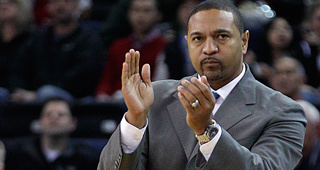“People often remark that I'm pretty lucky. Luck is only important insofar as getting the chance to sell yourself at the right moment. After that, you've got to have talent and know how to use it.” – Frank Sinatra
It has been incredibly tough to distill such a crazy series down to a core concept or theme. In six games, both the Golden State Warriors and Denver Nuggets (along with their fanbases) ran the full gamut of emotion with the Warriors coming out the other side with a hard-fought series win.
The story of the series is that the Warriors got a series of breaks heading into the first round, but still had to forge their own success through hard work and strong performances. They were fortunate to get the most beatable opponent seeded 1-5 in the Western Conference thanks to an injury to Danilo Gallinari (who George Karl interestingly noted was either the first, second or third best players on the Nuggets' roster this year) and them being a team that shot threes terribly the whole season. Despite those advantages, Denver’s length and activity made long stretches of games extremely difficult for Golden State, particularly once the Nuggets figured out how to defend Jarrett Jack.
Another decision that benefitted the Warriors was George Karl making strange decisions with his rotation throughout the series. After David Lee’s injury, Mark Jackson mostly went small (more on that later) and Karl responded by using less of big men JaVale McGee and Kosta Koufos, effectively denying his team one of their biggest advantages. We saw the impact of a fully sized Denver team early on in Games 5 and 6 when the team seemingly picked up an infinite amount of offensive rebounds.
Going small gave the Warriors the advantage in terms of both personnel and scheme since the reason Jackson used more perimeter players was to get his best players on the floor. On top of that, there were strange moments where Karl would overcorrect and play McGee and Koufos together. This took away their spacing and made them a much easier team to defend while also allowing the Warriors to get their bigs out of their comfort zone by using a PF who could at least shoot mid-range jumpers. I asked Karl about this after Game 3 and he responded that he began using the duo to stop the Warriors from getting as many offensive rebounds. Maybe playing them one at a time and not having their two biggest players be Kenneth Faried and Wilson Chandler would have helped that instead. The series could have taken on a dramatically different character if Denver had continued to play to their strengths rather than being afraid of their weaknesses.
Necessity is the mother of invention. A few of us in the media (most notably Ethan Sherwood Strauss) have been advocating nearly all season for Harrison Barnes to get some playing time at power forward because it would be difficult for opponents to handle when the Warriors were on offense without giving up too much on the defensive end. Throughout the season, Jackson steadfastly refused- the most used lineup with Harrison at the four played a whopping 28 minutes together all year. After David Lee’s hip flexor injury, Jackson had no choice but to give his rookie meaningful minutes at the position and the team responded with some of their best play of the year. Having a fourth player who Denver had to respect on the perimeter opened up the lane for more penetration as well as Barnes himself for plenty of good looks since bigs like Kenneth Faried did not like to go out to defend him in the corner. The times when Denver went smaller also meant more Andre Miller on the floor, which was a very, very good thing for the Warriors.
Another substantially fortunate element of the series win was that the Warriors did not face many consequences from some legitimately terrible execution in big moments.
In Game 6, the Warriors had chances to go two for one at the end of each of the three quarters. Each time they got into their offense so slowly that it became a one for one, losing the advantage. In fact, the Warriors did not score on a single one of those too-slow possessions but benefitted from the Nuggets going 0-for-3, as well and then having Corey Brewer make the stupidest foul of the year on Jarrett Jack with less than a second to go in the third. Awful decision-making on opportunities like this made the series much harder than it needed to be and that does not even include the disaster that was the last two minutes of this game. As someone obsessed with the “little things” in basketball, I was going legitimately insane when the Warriors both could not inbound and then even had to do it an extra time after Jackson called a senseless timeout. Hopefully those become teachable moments for the whole franchise.
The last majorly lucky development for Golden State was Denver’s heavy use of Andre Miller and lack of understanding of how to cover up his flaws defensively. It was amusing to hear Miller say after the game that his team was “outcoached” because one of the biggest reasons that statement is true is that Karl had far too much faith in him. As a general rule, playing your team’s worst defender on the other team’s best offensive player does not work out. In most circumstances, teams can shift guys around and hide the guys who cannot guard chairs if they need their production on the court on the other end. After a strong Game 1, Miller’s production on offense did not justify his use as anything other than a backup and his deplorable defense made him nearly unplayable. Of course, that did not stop Karl from putting him on Stephen Curry for some of the biggest moments in the second half of the series. A large portion of the Baby-Faced Assassin’s Game 4 explosion came with Miller on him and Karl kept it going for stretches of the following two games as well. In a series where the Nuggets lost two games by four or less points (and one largely off a stretch fueled by Curry roasting Miller), that decision played a major role in explaining why Golden State pulled out the series.
Despite all the good fortune, the Warriors still had to play well in order to beat a talented, deep Denver squad. All three rookies had strong moments, especially Harrison Barnes in Games 2, 3 and 5. Barnes did a good job on defense while also giving Karl a reason to be scared of playing a big at power forward, which helped keep Denver’s rotations out of whack.
Draymond Green became the most surprising shooter of the playoffs, making six threes at 50 percent shooting when he made 14 at 20.9 percent in 79 games during the regular season.
I asked Jackson about Draymond’s three-point shooting after Game 6 and he responded “[a]nybody on my team that puts the time in, there’s no shot I would tell them not to take.” After all, found money is always nice. The effort and intensity that Green brought all season got amplified with each big shot, especially with the crowd’s response at Oracle.
Andrew Bogut showed the team exactly what they were getting when they moved Monta Ellis 14 months ago. George Karl noted after the game that he had “forgotten how good [Bogut] was” when healthy- I’m guessing he will not forget any time soon.
Above and beyond those guys, Stephen Curry showed why he will be a difference-maker for years to come. His combination of insane range on his shot, underrated distribution ability, and supreme confidence make him the centerpiece of this team in every situation.
The sustained energy from the Oracle Arena crowd helped keep the Warriors in games even when they were playing badly (as they did in Games 4 and 6 early on) and very well could have been part of the reason Denver only shot 13-for-21 from the free throw line in Game 6. The crowd was so loud at the end of the series that I actually lost hearing in my right ear for a short stretch after the game. As someone who has covered and attended games all over the country, it was the loudest, best crowd I have ever seen.
Luck certainly played a role in explaining how and why the Warriors will play in the second round. They faced the perfect team and coach and benefitted immensely from some terrible tactical decisions that gave them extra leverage in some key moments. Even with all those advantages, it still took talent, guts, and some huge performances to move on to the second round. After all, things turn out best for the people who make the best of the way things turn out.



